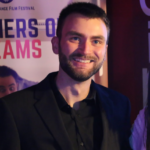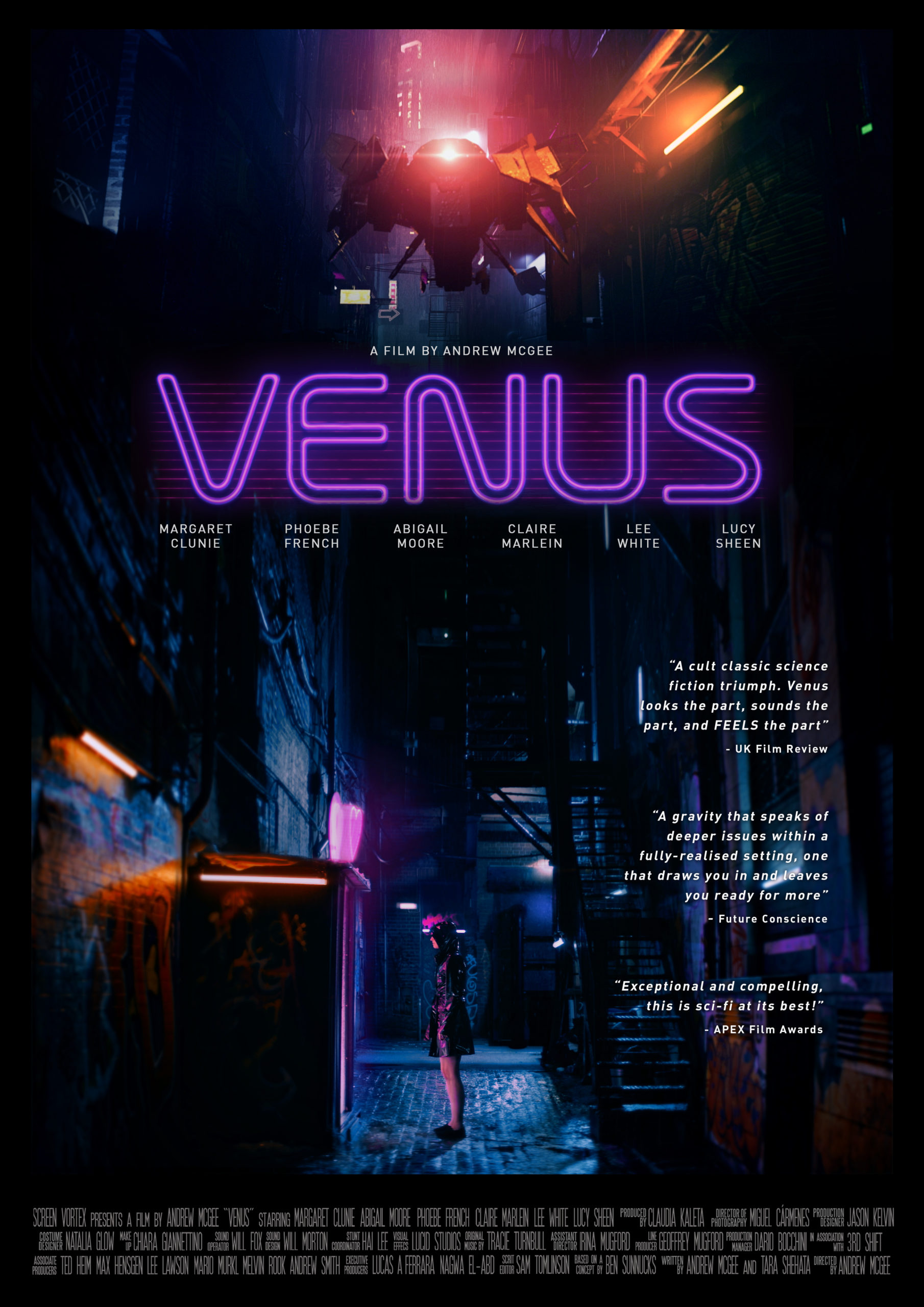
Andrew McGee
Andrew is an award-winning director and post-production specialist based in the UK, with a fondness for all things sci-fi. Inspired by blockbusters like The Matrix and Star Wars from an early age, he has always pushed the limits of filmmaking on a small (or non-existent) budget, striving to tell wildly ambitious and exciting character-driven stories.
After a hugely successful festival run with Venus, Andrew is now in the process of developing the short into a feature-length film, and can’t wait to tell the rest of Iris’s story.
Q & A
If the world you created in your film became a reality, is that a world you would want to live in? Is there a Sci-Fi world you’d buy a one-way ticket to?
I’d certainly visit for a holiday to admire the cityscape from a safe vantage point, and live out the cyberpunk fantasies of exploring a neon-lit sprawl in the rain while eating street food! The oppression and quality of life means it’s not somewhere I’d particularly want to live though, and I wouldn’t last long without any hacking or fighting skills. If I could choose, I’d live in the Star Wars or Mass Effect universe – at least before the Empire and Reapers show up. I’d love the freedom of space travel and endless new horizons to discover.
Name a Sci-Fi character you relate to on a spiritual level? Who is your Sci-Fi spirit animal/spirit alien?
Arthur Dent – I’m kidding myself I say anything cooler than a bewildered Brit just trying to get by! I enjoy the way authors like Douglas Adams and Terry Pratchett use the absurdity of science-fiction to reveal a real authenticity and relatability of a character; no matter how cosmic or world-ending the scenario, the mundanity of life will always be part of us, and it’s just as important. Other days, I’m Marvin.
Friend or Foe: humanoid robots with advanced artificial intelligence? What if robots start making their own Sci-Fi films? Will you support them in their endeavors?
I absolutely support all artists, fleshy humans and AIs alike! I’d love to see what a story told by a robot would look like (and hope they’ll see how sympathetic my films are towards robots – I’m totally on your side, guys.)
In 1996, Bugs Bunny recruited Michael Jordan and Bill Murray to form the greatest basketball squad of all-time, the Tune Squad; you’re Bugs, who’s on your Sci-Fi Tune Squad?
Neo as the captain – imagine the moves he could pull off. Ellen Ripley – see Alien 4. The Terminator for intimidation. Roy Batty as the wildcard. And I’ll throw a Jedi in for their jumping skills (certainly not so they can use the force to score hoops).
You’ve gotta go through some bad ideas to get to the good ones. Tell us one of your bad ideas. How do you get past the bad ones to find your spark?
I had one idea about a robot in a surreal afterlife world, simply because there was a cool-looking viaduct bridge nearby to use as a setting and I had a robot mask! It was such an abstract concept I don’t remember anything more, and thankfully it didn’t make it any further. There’s a certain excitement when you know you’re onto a winning idea, and if that feeling continues the more you develop it, you need to have faith that others will want to see it as much as you do.
Do you consider yourself part of a sci-fi community? Or when your brain is in the future and your body’s in the present, is that isolating?
I do! Many of my friends are also big sci-fi fans, so I’m lucky to not feel like a lonely nerd. Having spent a lot of time online in the run-up to Venus’s kickstarter and interacting with many sci-fi communities, it’s also great to see so much shared passion for something you love. That worldwide connection is rather new and novel, and it’s important not to take it for granted – even with the downsides of our hyper-connected era. Whenever I feel down that I probably won’t experience space travel or be alive to see major discoveries beyond our solar system, I remember there’s so much of Earth to explore, far more than can be seen in one lifetime. Aliens are welcome to hurry up and visit soon, though.
Do you consider yourself more of an analog or digital person? What kind of balance do strike between the two? Is there a disconnect between the technology you make films about and the technology that you make films with?
Although I could operate a VCR machine at the age of two (I needed my Thomas the Tank Engine fix), I grew up during the boom of the digital era and was always in-touch with tech. I can wrap my head around the process behind digital photography and video recording far more easily than physical film, but I love using my old analogue Zeiss camera. That anticipation of getting your reel developed and seeing whether you captured the masterful shot you envisioned (rare), or an overexposed blur (more common) is exciting, and of course there’s a different kind of texture and lighting to the image. Both formats have their uses, though choices are often limited by budget and practicalities, especially at an independent level of filmmaking. For Venus, ideally I’d have shot the simulation scenes on film and the real world digitally – I think that would be such an interesting use of form and really tie into the concepts of what’s ‘real’. I do like to disconnect from the digital world completely. I often enjoy taking time out to go hiking somewhere remote without signal and immerse myself in nature.
When you’re creating the props and sets that make a new world, where do you look for inspiration? How do you create objects that are relatable but unfamiliar?
I look for inspiration everywhere, from retro imaginings of our future to the latest cutting-edge technology. Obviously the first port of call is sci-fi artwork; I’m building a collection of concept art and production books from films and games which are great to get immersed in. There’s of course a vast amount of inspirational art online so I’m always saving images to a virtual scrapbook. The challenge is crafting truly unique designs, which is best left to the far more talented production designers, but I think our future will be much stranger than we can possibly imagine; the world as it is now couldn’t have been predicted 50 years ago, nor the 50 years before that. Sets and props need to have a relatability like you say, otherwise immersion is lost if you’re presented with something completely unfamiliar, but the fun is in finding where that line is. I thought the latest Dune film did that very well.
Lightning round: Star Wars or Star Trek? Philip K. Dick or William S. Burroughs? Practical or CGI? Dystopia or Utopia? Post Apocalypse or Pre Apocalypse?
Star Wars Philip K. Dick Both have their uses! Dystopia to watch, Utopia to live in Pre Apocalypse (what we’re currently living through…)


